Ministry assessing free education resources
Ministry of Education has embarked on an assessment of how it can successfully implement the 12-year free-cycle of education from January 1 2026, looking at available resources and sustainability amid dwindling donor support.
Secretary for Education Ken Ndala in an interview yesterday said that processes analysing the costs and where the resources will come from were underway.
Ndala said when developing such initiatives, there has to be an analysis in terms of where the resources would come from.
However, he sounded optimistic that the policy will start in January 2026 and that he did not anticipate immediate donor support.

Secondary School in Mzuzu. | Nation
Said Ndala: “In the first place, the Ministry of Education itself has two ministries [Basic and Secondary and High Education], this on its own is a cost. These are the issues that as technocrats we want to analyse and make some savings and then say why can’t we refocus these resources towards free secondary education?
“We also need to restrict the way we spend our resources like on travels and not just at the Ministry of Education, but the whole system. Further, government has an obligation to increase resources towards the sector.”
The Nation analysis last week established that the 12-year free-cycle of education, covering examination fees, identity cards and school development fund (SDF) at both primary and secondary levels would cost K412 billion each year.
Meanwhile, the United Nations Children’s Emergency Fund (Unicef) has expressed fears that the 50 percent reduction in US Agency for International Development (USAid) funding from 2024 to 2025 risks reversing hard-won gains in Malawi’s education sector.
In its analysis on the education budget for the 2025/26 fiscal year, Unicef argued that the creation of the Ministry of Higher Education, with an allocation of seven percent of the sector’s budget resulted in a redistribution of resources as the share managed by the Ministry of Basic and Secondary Education declined from 39 percent in 2024/25 to 27 percent in 2025/26 fiscal year.
But Ndala said the ministry was banking on government providing funding, not donors.
He said: “The donors are going to come, but as government we have to show commitment that we want to carry out this as a reform.
“We have tentative figures, but we are still doing an upscale analysis in terms of what is actually needed for government to have this in place. The key word is prioritising resources. We are also working with Treasury on how we are going to get resources.”
In an interview yesterday, Civil Society Education Coalition executive director Benedicto Kondowe said the proposed modalities raise feasibility concerns.
He said: “A sustainable approach requires a clear cost roadmap that secures predictable domestic financing—possibly through the national budget framework—while progressively engaging development partners for targeted support.”
Catholic University of Malawi head of the Education Department Alipo Kaphwiyo said experience from the 1994 Free Primary Education shows that the goal was quantity over quality because adequate resources were not provided.
She said: “Government has to ensure that adequate and relevant physical, material and human resources are made available in all public schools before implementation of the policy, strategies for sustainability must be put in place.”
Meanwhile, accountability expert Willy Kambwandira has said promises on cutting travel are normally met with lack of enforcement and administrative sanctions on senior government officers who defy such directives.
In 2018, the same Peter Mutharika administration abolished payment of K3 250 per student in all public secondary schools, thus K1 500 tuition fees per year, general purpose fund at K1 500 and textbook revolving fund at K250. However, the initiative that was planned to take off in January 2019 was deferred and later DPP was voted out through the court-sanctioned fresh presidential election





